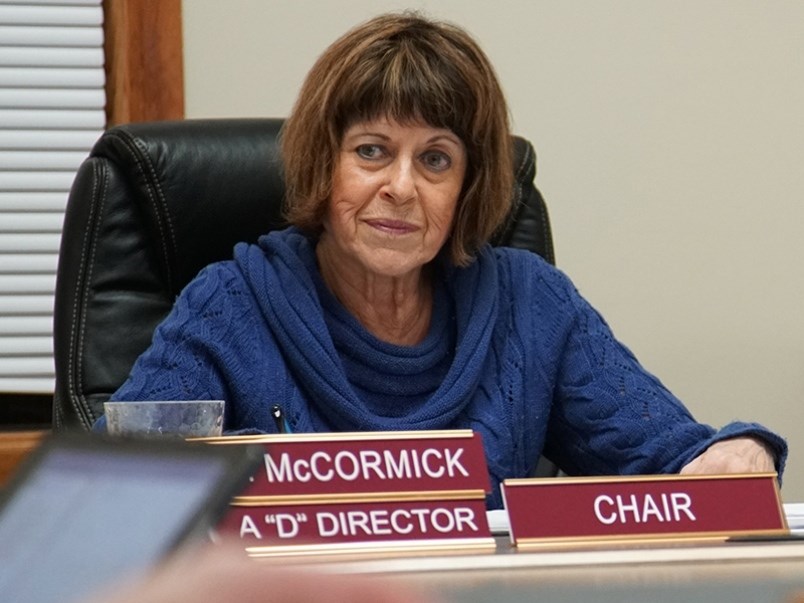qathet Regional District’s planning committee has voted to send a report to the regional board that it previously opted not to send.
At a planning committee meeting on May 12, Electoral Area D director Sandy McCormick said she wanted to move to reconsider a motion related to a feasibility study on a land use and development regulatory options report. At the April 14 meeting, she and Electoral Area B director Mark Gisborne voted against sending the report to the regional board, so the study did not receive any further consideration by the board, essentially relegating the report to the shelf, according to chief administrative officer Al Radke.
Gisborne asked why the report was being brought back for consideration. McCormick said it had come to her attention how important it is for the people in Electoral Area C to have this discussion.
“I believe it’s important for all communities to have their say,” said McCormick. “I’m bringing this forward.”
The planning committee voted to bring the matter forward for reconsideration.
The motion was that the committee recommend the board receive the feasibility study land use and development regulatory options final report dated April 7, 2020, and prepared for the regional district by the Arlington Group, and that the board defer any consideration of recommending next steps during the COVID-19 pandemic, at least until such time as social distancing directives have been lifted by the provincial health officer.
Gisborne requested that the motion be split into two parts, which the planning committee agreed to do.
Gisborne said the regional district spent a lot of money for this study, which is good to have, but he questioned whether it was worth the $23,000 spent on it.
“I’m in favour of receiving this study, but with everything going on right now I don’t think it would be a good idea to spend more money going down this road,” said Gisborne.
The planning committee voted to recommend the regional board receive the study.
With regard to the board deferring consideration of recommending next steps during the COVID-19 pandemic, Gisborne said the regional district has taken a look at amending the Electoral Area B and C official community plans. He said the public response from Area B was very much opposed to increasing regulation.
He said the feasibility study mapped out building permits and increased regulations in his area and he thought the estimate from staff was another $23,000 to $25,000 to take the next steps.
“It’s a lot of money and there doesn’t seem to be sufficient appetite at this time, so I’m going to be opposing the motion,” said Gisborne. “It doesn’t mean we can’t bring it forward at a future date, but we should receive the study and leave it at that and move on.”
McCormick said the motion on the table was to defer until the pandemic is over.
“I really find it hard to vote against that,” said McCormick. “Is that saying you don’t want to defer until this pandemic is over? I’m in support.”
Gisborne said the motion before the committee was that it would defer consideration of recommended next steps. He said he didn’t think the regional district needed to take any further steps, so he didn’t think they needed to defer consideration of recommended next steps.
“We should accept the feasibility study, we accept the money we’ve already spent, and we leave it at that,” said Gisborne. “Going forward saying we defer consideration is implying we do plan to continue with exploring increased regulations in the electoral areas.”
McCormick said the next steps are built into the report and that the recommendation is to defer those next steps.
“As we receive the report, we also receive the next steps,” said McCormick.
Gisborne said the next steps are outlined in the study. One of the next steps was to implement development permits, he said. From public feedback from Area B and C official community plan amendments, the path being taken is contrary to the next steps of the study, said Gisborne.
“We should finish what we started with the Area B and Area C official community plan amendments and then reconsider what is going on with the results of this feasibility study,” said Gisborne.
The planning committee voted in favour of the second part of the motion, with Gisborne opposed.
According to an extract from the feasibility study, based on the assessment of current regulatory status in qathet Regional District, it is recommended that the regional district consider an increased regulatory framework through a multi-phased program and selective approach, starting with public education and consultation on benefits and drawbacks of zoning in Electoral Areas B and C.
The study stated that depending on results of public consultation on the zoning options phase, initiation of a new zoning bylaw for Electoral Areas B and C, followed by a development permit area and guidelines for protection of development from already identified hazards, is recommended in the second phase. Consultation on adopting a building bylaw for rural areas phased in by electoral area is also recommended in the second phase.
The executive summary of the study indicates the regional district has a much lighter regulatory framework than most other regional districts in BC. It stated that a lighter regulatory framework provides for a quick process, lower fees and taxes for individuals, but less regulation includes significant drawbacks.



